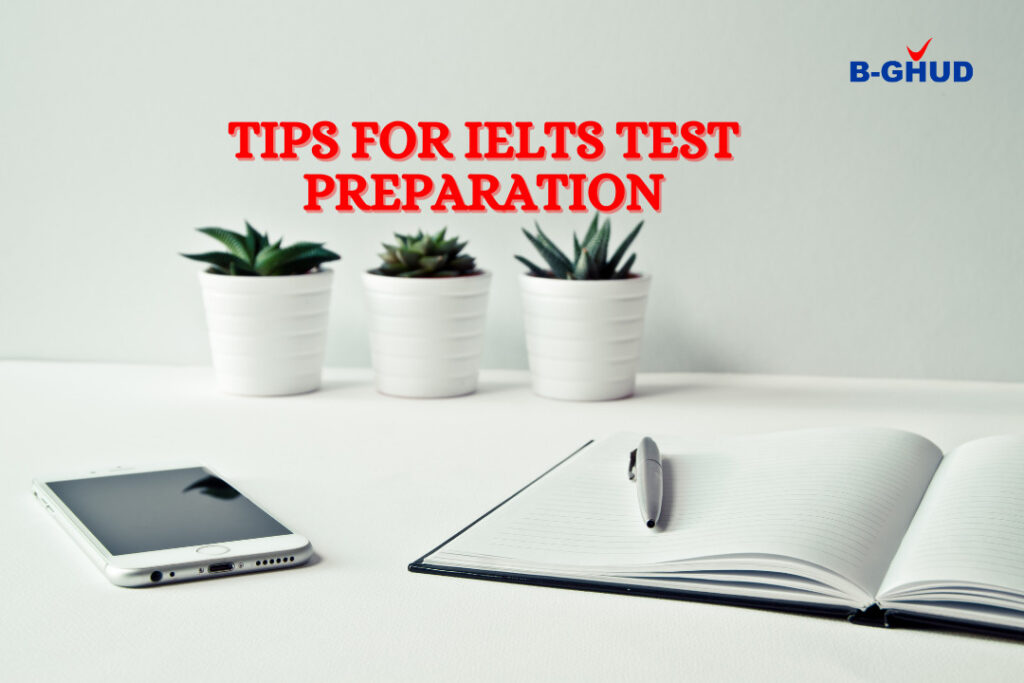Essential tips on How to start your OET Role Play on Test Day.

The Occupational English Test (OET) can be a nerve-wracking experience for healthcare professionals aiming to work in an English-speaking environment. Among the different components of the test, the Role Play section demands both language proficiency and the ability to handle real-life scenarios. To maximize your chances of success, it’s crucial to know how to start your OET Role Play confidently and effectively. With over 27 plus years of expertise in the field B-GHUD Academy is a premier IELTS Coaching Institute in Kerala. In this article, we’ll guide you through some essential tips to kick-start your Role Play on test day. Be Well-Prepared: Preparation is key to tackling any challenge, and the OET Role Play is no exception. Familiarize yourself with the OET Role Play format and guidelines provided in the official OET preparation materials. Understand the assessment criteria and practice role plays with study partners or tutors. The more prepared you are, the more comfortable and confident you’ll feel when starting the Role Play. Read the Role Play Instructions Carefully: Before the Role Play begins, take a moment to read the instructions provided. Pay attention to the role you are assigned, the scenario, and the specific tasks or questions you need to address. Understanding the instructions thoroughly will help you respond appropriately and effectively. Establish Rapport: Building rapport with your interlocutor is essential to establish a comfortable and professional atmosphere during the Role Play. Start by greeting your interlocutor politely, using appropriate salutations such as “Good morning” or “Hello.” A warm and friendly tone can help ease any tension and create a positive environment for communication. Introduce Yourself: At the beginning of the Role Play, introduce yourself briefly and professionally. State your name, profession, and any relevant background information that is necessary for the scenario. For instance, if you are playing the role of a nurse, mention your nursing experience or specialization. This introduction sets the stage for the conversation and demonstrates your professionalism. Active Listening: Effective communication involves active listening. Pay close attention to the interlocutor’s questions, concerns, or instructions. Show that you are engaged by nodding, maintaining eye contact, and using appropriate verbal cues to indicate understanding or empathy. Active listening not only helps you comprehend the situation but also enables you to respond appropriately and demonstrate your language skills effectively. Seek Clarification: If you encounter any uncertainty or need clarification during the Role Play, don’t hesitate to ask for more information. It is better to seek clarification than to provide inaccurate or incomplete responses. Politely ask for additional details or context to ensure that you understand the situation fully before formulating your response. Take Your Time and Think: Don’t rush into responding immediately. Take a few seconds to gather your thoughts and plan your response. Think about the most relevant information or advice you need to provide based on the scenario. This brief moment of reflection helps you deliver a well-structured and coherent response. Use Professional Language and Vocabulary: During the Role Play, demonstrate your command of professional language and vocabulary. Use appropriate medical terminology, but be mindful of your interlocutor’s understanding. Avoid using jargon that may confuse or alienate non-medical professionals. Aim for clear and concise language that effectively conveys your message. Maintain a Positive Attitude: Finally, maintain a positive and professional attitude throughout the Role Play. Stay calm, even if you encounter challenging situations or difficult questions. Remember that the assessors are evaluating your language skills and your ability to handle professional scenarios, so maintaining composure is crucial. Final Thoughts: Starting your OET Role Play confidently and effectively can significantly impact your performance on test day. By preparing thoroughly, understanding the instructions, building rapport, actively listening, seeking clarification when needed, taking time to think,
The negative impacts of Globalisation?

The negative impacts of Globalisation? Globalization has had both positive and negative impacts on economies, societies, and the environment. While globalization has brought numerous benefits such as increased economic growth, access to new markets, and cultural exchange, it has also been associated with several negative consequences. Here are some of the negative impacts of globalization: Inequality: Globalization has exacerbated income inequality both within and between countries. Developed countries tend to benefit more from globalization, while developing countries often struggle to compete and face increased inequality within their own societies. This can lead to social unrest and political instability. Job Displacement: Globalization has led to the outsourcing and offshoring of jobs from developed countries to low-wage countries. This has resulted in job losses, particularly in manufacturing industries, in developed countries. Workers who lose their jobs often face difficulties finding new employment, leading to economic hardships and social tensions. Exploitation of Labor: In the race to cut costs and increase profits, some multinational corporations exploit cheap labor in developing countries. Workers may be subjected to poor working conditions, low wages, long hours, and limited labor rights. This has raised ethical concerns and led to calls for better labor standards and regulations. Environmental Degradation: Globalization has increased the demand for natural resources and production, leading to environmental degradation. The pursuit of economic growth has often come at the expense of ecosystems, leading to deforestation, pollution, and climate change. Global efforts to address these issues have been slow and insufficient. Cultural Homogenization: Globalization has resulted in the spread of Western culture and values, leading to the erosion of traditional cultures and languages in many parts of the world. This can lead to a loss of cultural diversity and identity, as well as cultural clashes and tensions. Health Risks: Globalization has facilitated the rapid spread of diseases and pandemics. Increased travel and trade can accelerate the transmission of infectious diseases across borders. Moreover, global trade agreements can limit countries’ ability to regulate harmful products such as tobacco, leading to negative health impacts. Economic Dependence: Globalization has created economic interdependence among countries, making them vulnerable to global economic crises. Financial instability in one country can quickly spread to others, leading to economic recessions and hardships for millions of people. It is important to note that while globalization has its drawbacks, it has also brought significant benefits. Efforts should be made to mitigate the negative impacts and ensure that the gains of globalization are more equitably distributed.
Why pronunciation plays a key role in your IELTS Examinations and how to improve it?

The International English Language Testing System (IELTS) is a widely recognized exam that assesses the proficiency of non-native speakers in English. It is essential for students who are planning to study or work abroad, and achieving a high score is crucial for success. However, one of the most challenging aspects of the IELTS exam is pronunciation. Poor pronunciation can lead to miscommunication, affecting your overall score. In this blog post, we will discuss why pronunciation plays a key role in your IELTS examination and how to improve it. Why is Pronunciation important in IELTS? Pronunciation is a crucial component of language learning, and it plays a key role in effective communication. It is the way you articulate words, sounds, and intonations, which make your message clear and understandable to the listener. In the IELTS exam, your pronunciation is assessed in several ways, including accuracy, stress, intonation, and rhythm. Therefore, if your pronunciation is weak, it can negatively impact your score. How to Improve Pronunciation in IELTS? Improving your pronunciation can be challenging, but with the right techniques and practice, you can achieve a high score. Here are some ways to improve your pronunciation in IELTS: 1. Listen to Native Speakers : One of the best ways to improve your pronunciation is to listen to native speakers. This helps you to familiarize yourself with the sounds, intonations, and rhythms of the language. Listen to English news broadcasts, podcasts, songs, and movies. This will help you to understand the correct pronunciation of words and phrases. 2. Record Yourself Speaking: Recording yourself speaking is an excellent way to identify areas where you need to improve. Record yourself speaking and listen to it carefully. Identify the areas where you need to work on, such as stress, intonation, or rhythm. You can also ask a teacher or a native speaker to provide feedback on your pronunciation. 3. Practice with a Native Speaker: Practicing with a native speaker is one of the most effective ways to improve your pronunciation. They can help you to identify and correct your mistakes. You can join a language exchange program, hire a tutor, or attend an IELTS coaching centre like B-GHUD Academy. 4. Focus on Stress and Intonation: Stress and intonation are important aspects of pronunciation. Stress refers to the emphasis you put on certain syllables or words in a sentence. Intonation refers to the rising and falling of your voice as you speak. Practice stressing the right syllables and using the correct intonation for different types of sentences. 5. Learn the Phonetic Alphabet: The Phonetic Alphabet is a set of symbols that represents the sounds of English. Learning the Phonetic Alphabet can help you tounderstand the correct pronunciation of words. You can practice using the Phonetic Alphabet by transcribing words and phrases. 6. Use Online Resources : There are many online resources available that can help you to improve your pronunciation. Use online pronunciation guides and tools to practice your pronunciation. You can also watch videos of native speakers and practice imitating their pronunciation. Summary: Pronunciation plays a crucial role in your IELTS examination. Poor pronunciation can affect your overall score, so it is essential to improve your pronunciation skills. To improve your pronunciation, listen to native speakers, record yourself speaking, practice with a native speaker, focus on stress and intonation, learn the Phonetic Alphabet, and use online resources. And, if you’re looking for the best IELTS coaching centre in Kerala, B-GHUD Academy is are pioneer in providing the best IELTS & OET Coaching. With our experienced faculty and comprehensive curriculum, they provide personalized coaching and guidance to help you achieve your desired score.
IELTS Reading: Seven FAQs Answered for Success

The IELTS Reading section is an integral part of the International English Language Testing System (IELTS) exam, and it often raises numerous questions among test-takers. To help you navigate this section with confidence and achieve success, we have compiled a list of seven frequently asked questions (FAQs) about IELTS Reading from B-GHUD Academy, the Top IELTS Training Institute in Kerala. Read on to find answers to these queries and unlock the secrets to mastering this critical component of the exam. 1. How many passages are there in the IELTS Reading section? The IELTS Reading section consists of three passages, each followed by a set of questions. These passages are usually taken from books, journals, newspapers, or magazines and cover a range of topics. It is essential to allocate your time wisely to read and comprehend each passage thoroughly. 2. Should I read the entire passage before attempting the questions? While some test-takers prefer to read the entire passage before tackling the questions, it is not necessary. Skimming the passage to get a general idea of the content and scanning for specific details when required can be equally effective. Develop your own strategy, such as reading the first and last sentences of each paragraph to grasp the main ideas quickly. 3. Are the questions in the order they appear in the passage? No, the questions in the IELTS Reading section are not necessarily in the same order as the information in the passage. This is a deliberate tactic to test your ability to locate information accurately. Carefully read the instructions and question prompts to identify keywords or phrases that can guide you to the relevant section of the passage. 4. Can I use all capital letters while transferring answers to the answer sheet? Yes, you can use all capital letters for your answers on the answer sheet. However, it is crucial to ensure that your handwriting remains clear and legible. Illegible handwriting can result in the incorrect interpretation of your answers, potentially leading to a loss of marks. 5. How should I manage my time during the IELTS Reading section? Time management is crucial for success in the IELTS Reading section. Allocate roughly 20 minutes per passage, including the time spent on reading and answering the questions. If you find yourself struggling with a particular question, move on and come back to it later if time permits. 6. Should I guess the answers if I’m unsure? If you are unsure about an answer, it is better to make an educated guess rather than leaving it blank. There are no penalties for incorrect answers in the IELTS Reading section, so taking a calculated guess increases your chances of getting the answer right. Use contextual clues from the passage or eliminate obviously incorrect options to make an informed guess. 7. How can I improve my reading skills for the IELTS exam? Improving your reading skills requires consistent practice. Start by reading a variety of English texts, such as newspapers, magazines, and online articles, to familiarize yourself with different writing styles and topics. Additionally, solve practice tests to get acquainted with the IELTS Reading format and develop strategies to answer different question types effectively. Final Thoughts: The IELTS Reading section can be challenging, but with proper preparation and a clear understanding of its nuances, you can excel. Develop effective reading strategies, practice regularly, and familiarize yourself with the format and question types to maximize your chances of success. Remember, the key lies in comprehending the passages efficiently and applying smart techniques to answer the questions accurately.
How to improve your Grammatical Range and Accuracy in IELTS Speaking.

The International English Language Testing System (IELTS) speaking test is a crucial part of the IELTS exam that assesses your ability to communicate effectively in English. One of the most important aspects of the speaking test is grammatical range and accuracy. As one of the Best IELTS Coaching Centre in Kerala, here are some techniques to help you improve your grammatical range and accuracy in IELTS speaking: 1. Practice with native speakers: One of the best ways to improve your grammatical range and accuracy is to practice speaking with native English speakers. This will help you to identify your weak points and work on improving them. 2. Read extensively: Reading is an excellent way to improve your grammar and vocabulary. Make a habit of reading English newspapers, magazines, books, and online articles. This will expose you to a variety of grammatical structures and sentence patterns. 3. Learn grammar rules: Brush up on the basic grammar rules of English. You can do this by taking an online course or by purchasing a grammar book. Once you have a good understanding of the grammar rules, practice applying them in your speaking. 4. Watch English TV shows and movies: Watching English TV shows and movies will help you to understand how native speakers use English in real-life situations. This will help you to learn new vocabulary and sentence structures. 5. Use the correct tenses: Make sure you use the correct tenses when you are speaking. This is particularly important when you are telling stories or talking about events that happened in the past. 6. Practice pronunciation: Pronunciation is an important part of grammatical accuracy. Work on pronouncing English words correctly by listening to native speakers and practicing your pronunciation. 7. Use conjunctions: Conjunctions are words that connect two clauses or sentences. Using conjunctions will help you to link your ideas together and create more complex sentences. 8. Learn phrasal verbs: Phrasal verbs are an essential part of the English language. Learning them will help you to sound more natural and fluent in your speaking. 9. Practice paraphrasing: Paraphrasing is the ability to express the same idea in different words. This is an important skill to have in IELTS speaking, as it shows that you have a good understanding of the language. 10. Get feedback: Finally, get feedback on your speaking. This could be from a teacher, tutor, or language partner. They will be able to identify your weak points and give you feedback on how to improve. Summary: Improving your grammatical range and accuracy in IELTS speaking is crucial for getting a good score on the exam. By practicing with native speakers, reading extensively, learning grammar rules, watching English TV shows and movies, using the correct tenses, practicing pronunciation, using conjunctions, learning phrasal verbs, practicing paraphrasing, and getting feedback, you can improve your grammar and sound more natural and fluent in your speaking. Remember, practice makes perfect, so make sure you dedicate time to practicing your speaking skills regularly.
CLARITY IS KEY IN IELTS

CLARITY IS KEY IN IELTS There seems to be a wrong notion embedded in the minds of IELTS test takers that it is mandatory to write or speak high-sounding words in the IELTS exam. Using bombastic words need not attract a high band in IELTS. Topic related vocabulary or reasonably uncommon WORDS, but with contextual relevance, are expected in IELTS Writing & Speaking for a score 6.5 or above. High end words in IELTS do not mean that certain high- sounding memorised words or some confusing and misleading phrases. What the IELTS exam conductors mean is that if you are smart enough to use the right collocations and right words which are suitable for the topic discussing, you can attract a score above 6.5 band or more. However, in reading your familiarity with many uncommon words, understanding of the meaning certain uncommon words and their contextual use might be useful. It is because some reading passages appear to be difficult as there may be quite a few difficult lexical resource, especially in the 3rd passage. Suffice to say that having a good command of vocabulary is required, but not the use of any misleading words or phrases to impress the examiner. It is worth to note that examiners are trained to identify the use of unnecessary and bombastic or declaratory words or phrases. B-GHUD ACADEMY Mavelikara & Kochi
TIPS FOR IELTS TEST PREPARATION

IELTS is an international English language proficiency test and it has been designed in such a way that all the skills necessary to have a good standard in the language are tested. There are certain important matters that an IELTS aspirant should essentially know to be able to face the test confidently. Know first of all that passing IELTS is no child’s play, but neither is it a very difficult task. If you know what to do and prepare yourself accordingly, you can easily become an IELTS holder. Here, B-GHUD Academy, the best IELTS coaching Centre in Kerala, shares their 26 years of experience in the field to help students. The IELTS test format It is extremely important that you know the IELTS test format. The key to your success in IELTS is a sound familiarity with the test pattern and format. B-GHUD has published one of the bestselling books in India on IELTS, “IELTS & TOEFL Made Easy,” which contains exhaustive information on each and every aspect of the test. It will give you all the information, tips and lessons that you will need to face IELTS with a smile. IELTS Listening Module IELTS listening module is demanding. You have to provide answers to 40 questions during 4 recordings. The recordings will be played only once. Typical questions include sentence completion, summary completion, form completion and multiple choices. It is possible for you to get lost during a conversation, but you need to recover fast or you will miss all the questions of that task afterwards. This would be a disaster. As such, it is essential to understand how to follow a conversation, even if you miss something and how you can recover to continue answering the next questions. You are also expected to understand what type of information to supply depending on the question type – a number, a name, an address etc. The Speaking Module This test is less than 15 minutes long and is split into three parts. The first 5 minutes are reserved for introduction and general topics between the test taker and the examiner. The second part assesses the test taker’s ability to speak about a random topic given on a cue card. The last part merely adds complexity to the second. At this stage, the examiner will also pay attention to pronunciation, lexical resources and fluency. Practising each part under exam conditions is essential to your test preparation and you will also get used to the pressure you will have during the test. You need to be able to write down notes that will help you to talk for two minutes during the second part of the test. You should also practice answering questions when you don’t really know the answer. Remember that your knowledge is not assessed but your English language proficiency is. IELTS Reading Module The IELTS reading module tests a wide range of reading skills such as reading for gist, reading for main ideas, reading for detail, skimming, understanding logical argument and recognising writers’ opinions, attitudes and purpose. Test takers have to provide short answers, match information, complete sentences, match headings or complete diagram labels. It is essential, therefore, to practise includes a wide variety of questions so that you become accustomed to each type. As such, developing a wide range of reading skills is essential. Timing is of vital importance in the reading module. You will not have the time to go through the texts several times. There are strategies to help you to avoid this situation, for example, how to skim the text and what kind of information you need to focus on. The Writing Module It is found that the writing module is the most difficult of all. Both tasks in the academic training must be written in a formal style. Task 1 requires that you interpret a graph/chart/table etc., which requires significant practice in English. Task 2 is writing an essay on a given topic and presents a number of challenges. Often, the topic given can be hard to develop if you are not familiar with it. In addition, the essay must have a proper structure. For Task 2 requires that you write different types of essays such as Agree or Disagree, Discuss two Opposing Opinions, Advantages and Disadvantages, Problems and Solutions, Causes and Solutions, Causes and Effects. You have to familiarise yourself with the structure of an essay, how to develop it, how to write the introduction and the conclusion. You must be able to connect your ideas using cohesion and coherence. Tips in general Take a practice test. Understand the test format. Be aware of the exam time constraints. One of the biggest mistakes students make is to forget to improve their English. Start preparing for your test well in time. We recommend finding an institution which will help you with English development and IELTS strategies. Listen to native speakers talking to one another and if possible join in. Bear in mind that self-learning is possible as long as you are committed. Above all, to make things really easy for you, why not join B-GHUD Academy, the leaders in the field and the top training Centre for IELTS in Kerala, India?
BEST IELTS WRITING STRATEGIES IN 2023

To live up to its reputation of being the best IELTS training Centre in Kerala, B-GHUD Academy keeps striving to provide its IELTS students with whatever guidelines are necessary. Here are the IELTS writing strategies IELTS students should be equipped with to enable them to do commendably well in the IELTS tests. 1. IELTS writing is for 60 minutes. Task 2 (Essay) is longer than Task 1 (Graph/Letter) and it also fetches double the marks. It is, therefore, important that students wisely divide the time for each task. Spend 20 minutes on Task 1 so that they can take 40 minutes to attempt the essay comfortably. 2. IELTS students should essentially read and understand the topic thoroughly well. It is because an IELTS essay should address the different parts of the topic relevantly. Otherwise, the task would not be achieved and the IELTS student will lose marks. 3. While writing the introduction, every IELTS student should make sure that they use their own words. Copying the topic as it is to write the introduction will be penalised – copied material will not be counted and your total word count would come down. Make sure that you rephrase the topic for your introduction. 4. After having thoroughly understood the different aspects of the topic – that is, after ensuring exactly what points in the essay are to be dealt with – make a plan mentally on how to approach the essay, what to write and how. You may use rough paper to jot down the points. 5. Divide the main body of your essay into paragraphs. You may write two or three body paragraphs depending on the topic. It is in these paragraphs that you present your main ideas. You should write these ideas clearly and support them with examples. If your ideas are clear and well-supported, you will get more marks. 6. While writing the main paragraphs, ensure that they are linked together using “coherence.” Your writing becomes exceptionally impressive if you use apt words or phrases for coherence. An example of good coherence is given below. a. Body paragraph 1 begins: “On the one hand….” b. Body paragraph 2 begins: “On the other hand….” The coherence used above clearly shows that your ideas are contrasting. All essays in B-GHUD books, “IELTS & TOEFL Made Easy” and “IELTS Writing Made Easy” (there are nearly 500 of them!) use an extensive range of coherence for the IELTS students to master prompt use of them. 7. You should write your essay in a discursive style. It means that the sentences you write in a paragraph should be linked together using connective words. It is known as “cohesion.” Cohesion ensures attractive writing. An example of cohesion is given below. “Space research is of great benefit to a nation. However, it is extremely expensive.” This sentence means that “although space research is beneficial, it is very expensive.” See how well the word, ‘however,’ connects the two sentences! Similar to coherence, our books, “IELTS & TOEFL Made Easy” and “IELTS Writing Made Easy” use countless examples of cohesion in their essays for the IELTS students to have a good grasp of them. 8. Lexical resources are another important factor in writing good IELTS essays. The test taker should try to use his own words. Remember, also, to use topic-related words. Topic-related words are those words that are closely related to the topic in question and are usually used frequently while writing or speaking about the subject. For example, if the topic is “pollution,” the related words are waste disposal, waste management, pollution control, effluent treatment, carbon emission, carbon footprint, global warming, environmental problems, greenhouse effect, climate change, deforestation, afforestation and so on. All IELTS essays in our books, “IELTS & TOEFL Made Easy” and “IELTS Writing made Easy” invariably use topic-related words, phrases and terms to benefit IELTS trainees. B-GHUD maintains its position as the top IELTS Coaching Centre in Kerala by ensuring that its students are provided with the best guidance. 9. GRA (Grammatical Range and Accuracy) is one of the main criteria for the evaluation of IELTS essays. Grammatical range means that the IELTS test takers should write a variety of sentence structures in their IELTS essays. B-GHUD book, “IELTS & TOEFL Made Easy,” caters to an extensive range of attractive structures (see pages 108, 109, 187, 239, 240, 300) for IELTS students to imbibe, so that they can write the impressive language. Grammatical accuracy generally means that the IELTS test takers should use the correct tenses in their IELTS essays. There are any number of interesting and intelligent exercises in our book, “IELTS & TOEFL Made Easy,” for the IELTS students to get adept at the use of the right tenses (“Syntax”) in their IELTS writing. 10. Writing the concluding paragraph is yet another important area where that IELTS students should be careful about. Since the conclusion is the last part of your essay, it creates a lasting impression on the evaluator. IELTS students should, therefore, try to make it striking. Your conclusion should not only be logical, but it also should not vary from the thesis sentence you have already written in the introduction. Consistency of your view is what the examiner looks for. 11. Last but not least, your word count should be sufficient (not less than 250 words.) Keep check of your word count from time to time while writing, so that your essay is neither short of the requisite word count nor too long. Whereas short answers will be penalised, you get no extra marks for long essays. Check your essay for grammar, spelling and punctuation errors before turning in your answer paper. We at B-GHUD Academy make it customary to train our IELTS students in line with these strategies. It is thus that we consistently achieve a high success rate and keep being the No.1 IELTS coaching centre in Kerala.
HOW DOES B-GHUD ACADEMY STILL EXIST?

B-GHUD has survived many challenges during the last 26 years and emerged victorious in the rat race of mushrooming institutes only because it has been producing excellent results since its inception in 1996. Of all the institutes of IELTS and TOEFL which started during that period, many of them could not survive because of fierce competition in the field, inability to be adaptable to the paradigm shifts in the fields, unprofessional management, the absence of futuristic vision and the inability to move with the times. Positive word of mouth, it is generally said, is the most reliable marketing strategy. B-GHUD ACADEMY has been abundantly blessed with it for valid reasons. Beyond all these B-GHUD could help a huge number of successful candidates score a high band in the global English exams required for studying abroad and migrating to progressive nations. In addition, the consistency in generating commendable results has enabled this institute to fetch students and job aspirants from the length and width of India. It is worth mentioning that B-GHUD ACADEMY is the only institute in South India which published 8 comprehensive best-selling books on IELTS, OET and global exams on nursing. These books certainly have facilitated a good number of students in India and the Gulf to reach their dream universities and helped numerous job aspirants settle in knowledge-based economies such as the US, the UK, Australia, New Zealand, Ireland, Canada Malta, Germany and the four Scandinavian countries. As there is hardly any gap between what B-GHUD promises and what they deliver, students from different parts of India still come to this remote town called Mavelikara for intensive training. Since the student-teacher ratio is one of the best in the industry, B-GHUD ACADEMY could deliver quality in all these years. It is worth mentioning that most of the senior trainers of B-GHUD ACADEMY were trained by the British Council and IDP. The legacy of these 26 years is being endorsed by the number of students who studied here and their results. Today most of our students are either the relatives of our successful candidates or their friends. Happy customers fetch new customers. The OET section of B-GHUD ACADEMY has been producing excellent results since OET was introduced in India 4 years ago. B-GHUD has written three books on OET alone. (OET AT 1ST ATTEMPT, OET SPEAKING MADE EASY & OET WRITING MADE EASY). Regular mock tests, in-depth analysis of grammar, ample opportunities to practise role-plays with our experts and intensive training on the Reading and Writing modules have helped our students score the required band score to settle in their dream destinations. As per the demand for intensive training in Kochi, B-GHUD ACADEMY has opened its branch in Kochi 3 years ago. There also we impart qualified training on IELTS, OET, PTE & German. We start our OFFLINE TRAINING at 9 am and end at 7.30 pm. Our ONLINE TRAINING commences at 7 am and ends at 10 pm. Students can choose either online or offline. Last but not least, when other institutes have been charging exorbitant fees for these courses, B-GHUD has been charging the lowest fee in the field. As we never compromise on quality, you can join our courses with confidence. It is better to learn from the authors of 8 books which are being taught and sought after by most institutes in India. We look forward to teaching you one of these global exams.
Best IELTS Coaching Centre in Kerala

B-GHUD has been providing hundreds of thousands of our youth with the best IELTS online/offline coaching available in Kerala for over a quarter of a century. In fact, B-GHUD is the best IELTS training centre in all of South India. B-GHUD keeps us its tradition of being the top ranker in all Kerala for securing the best results for IELTS year after year. Hence its reputation of being the No. 1 training centre for IELTS in Kerala. IELTS is regarded as the world’s most popular English Language Proficiency Test. A pass in the test is mandatory to join an institute of higher education in nations where English is the main language, such as the UK, the US, Australia, New Zealand, Canada etc. It is jointly managed by the University of Cambridge, British Council and IDP. B-GHUD is a Platinum Jubilee Member of the British Council. IELTS Test Types: ACADEMIC & GENERAL IELTS has two types of test. IELTS Academic: This is for students who wish to study in nations where English is the main language, such as the UK, the US, Australia, New Zealand, Canada etc. IELTS General: It focuses on English survival skills and social and workplace language. It is ideal for those who are planning to migrate to English-speaking countries such as the UK, the USA, Australia, Canada and New Zealand. IELTS Evaluation Both IELTS Academic and General Tests have four modules: Listening, Speaking, Reading and Writing. Students will be given a score of 1-9 for each part of the test. Your average score produces an overall IELTS band score, and you can be graded on whole or half points. The candidate may receive their test results in 13 business days after the test. Once graded, your IELTS score is valid for two years. Why is IELTS important? IELTS scores are widely accepted by more than 10,000 organizations across the globe, including universities, employers, and migration authorities as valid proof of the candidate’s English proficiency. Besides these, the test actively avoids cultural bias and treats candidates with utmost fairness. The one-on-one speaking test provides a real-life like situation in which the candidate is given an opportunity to speak naturally. It seems to be a convenient test that assesses the candidate’s English language skills almost accurately and provides no restrictions on candidates re-taking the test. Last, but not least, the test can be accessed from any of the many test centers widely strewn across the globe either in the pen and paper format or in the CBT (Computer Based Test) format. B-GHUD provides all assistance for test registration. Join B-GHUD, the No. 1 and the best IELTS coaching centre in Kerala for the best IELTS coaching Online or Offline at your earliest. B-GHUD assures you the best training for IELTS so that your success is assured. We strive to be on the top and ensure that position by dint of our professionalism and sincere approach.
